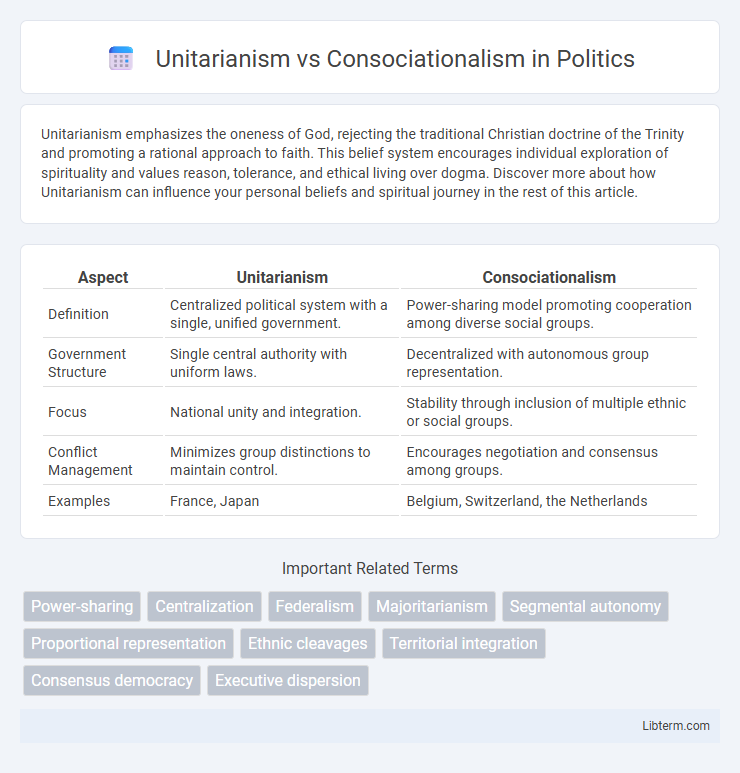Unitarianism emphasizes the oneness of God, rejecting the traditional Christian doctrine of the Trinity and promoting a rational approach to faith. This belief system encourages individual exploration of spirituality and values reason, tolerance, and ethical living over dogma. Discover more about how Unitarianism can influence your personal beliefs and spiritual journey in the rest of this article.
Table of Comparison
| Aspect | Unitarianism | Consociationalism |
|---|---|---|
| Definition | Centralized political system with a single, unified government. | Power-sharing model promoting cooperation among diverse social groups. |
| Government Structure | Single central authority with uniform laws. | Decentralized with autonomous group representation. |
| Focus | National unity and integration. | Stability through inclusion of multiple ethnic or social groups. |
| Conflict Management | Minimizes group distinctions to maintain control. | Encourages negotiation and consensus among groups. |
| Examples | France, Japan | Belgium, Switzerland, the Netherlands |
Introduction to Unitarianism and Consociationalism
Unitarianism emphasizes a centralized government structure where political authority is concentrated within a single, unified state, promoting uniform policies and reducing regional autonomy. Consociationalism, in contrast, is a power-sharing system designed for pluralistic societies, ensuring representation and autonomy for diverse ethnic, religious, or linguistic groups through mechanisms like grand coalitions, mutual vetoes, and segmental autonomy. These contrasting governance models address the challenges of managing societal divisions, with Unitarianism favoring integration and Consociationalism prioritizing group accommodation.
Historical Development of Unitarian and Consociational Systems
Unitarianism historically emerged with the centralization of state power, as seen in the French Revolution's establishment of a strong, centralized Republic aimed at unifying diverse regions under a single legal and administrative framework. In contrast, consociationalism developed in deeply divided societies like the Netherlands and Belgium, where power-sharing arrangements and mutual vetoes between distinct ethnic or religious groups helped maintain stability and prevent conflict. The evolution of consociational systems often reflects a pragmatic response to pluralism, emphasizing coalition governments and proportional representation to accommodate diverse identities within a decentralized state structure.
Core Principles of Unitarianism
Unitarianism centers on a single, sovereign government that holds ultimate authority, ensuring uniformity in laws and policies across a nation. It emphasizes centralized decision-making, with local or regional authorities exercising only delegated powers. This core principle contrasts with consociationalism, which promotes power-sharing among distinct groups and decentralized governance to manage societal diversity.
Key Features of Consociationalism
Consociationalism is characterized by power-sharing arrangements designed to manage divided societies through grand coalitions, mutual veto rights, proportional representation, and segmental autonomy. Key features include guaranteed representation of distinct ethnic or religious groups in government institutions, fostering cooperation among elites to maintain political stability. This structure contrasts with Unitarianism, which emphasizes a centralized authority and uniform governance without formal power-sharing mechanisms.
Political Structure: Centralization vs Power-Sharing
Unitarianism emphasizes a centralized political structure where authority is concentrated in a single national government, minimizing regional autonomy. Consociationalism adopts a power-sharing model designed to accommodate diverse ethnic, religious, or linguistic groups by allocating political power through coalition governments and mutual vetoes. This approach fosters stability in divided societies by ensuring representation and cooperation among multiple interest groups.
Representation and Minority Rights
Unitarianism centralizes political power and often limits regional representation, which can marginalize minority groups by reducing their influence in national decision-making processes. Consociationalism promotes power-sharing through proportional representation, granting minorities guaranteed seats and veto rights to protect their interests within a pluralistic society. This model fosters inclusive governance by institutionalizing minority rights and ensuring their active participation in political negotiations.
Decision-Making Processes
Unitarianism centralizes decision-making within a single, unified government, streamlining policy enforcement through a cohesive authority structure. Consociationalism distributes power among diverse groups via mechanisms like proportional representation, mutual vetoes, and segmental autonomy to ensure inclusive governance. This decentralized approach fosters cooperation among different communities, balancing interests and maintaining stability in pluralistic societies.
Advantages of Unitarianism
Unitarianism centralizes authority in a single, cohesive government, promoting national unity and streamlined decision-making processes. This system minimizes administrative duplication and reduces inter-regional conflicts by enforcing uniform policies across the entire state. Enhanced policy consistency under Unitarianism facilitates efficient resource allocation and national development without the complexities of power-sharing arrangements.
Benefits and Challenges of Consociationalism
Consociationalism offers benefits such as political stability in deeply divided societies by promoting power-sharing and protecting minority rights through institutional arrangements like proportional representation and segmental autonomy. Challenges include potential perpetuation of ethnic divisions, complexity in decision-making processes, and risk of elite manipulation that may hinder effective governance. The model requires careful balancing to ensure inclusivity while avoiding gridlock and entrenchment of societal cleavages.
Case Studies: Global Examples and Lessons Learned
Unitarianism centralizes political power within a single national government, exemplified by France's administrative system, where decision-making is streamlined but ethnic minorities often seek greater autonomy. Consociationalism, as practiced in countries like Belgium and Lebanon, accommodates diverse groups through power-sharing agreements, fostering stability amidst ethnic or religious divisions while sometimes entrenching factionalism. Comparing these models reveals that unitarian systems excel in policy uniformity, whereas consociational frameworks prioritize conflict management and representation in deeply divided societies.
Unitarianism Infographic

 libterm.com
libterm.com